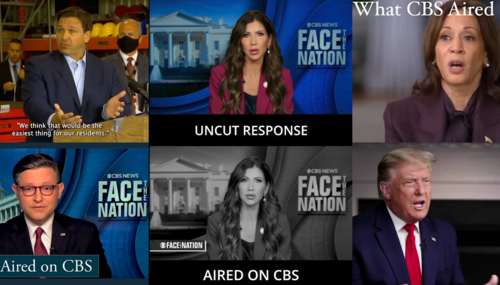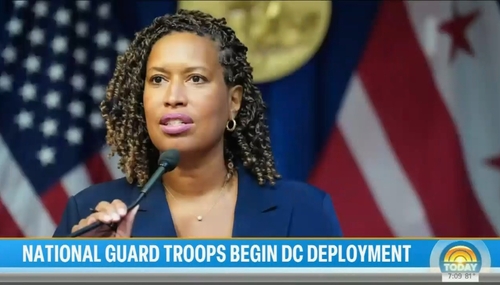
Gore and Branson, appearing in the 7:00 half hour of the "Early Show," discussed a reward offer, where they are offering $25 million to a scientist who can figure out a way to extract carbon from the atmosphere. But, Mr. Smith lamented that this idea sounded like the men were giving up on the idea of conservation and reducing emissions:
"But, you know what, when you hear about somebody going up and figuring out some sort of contraption to get the, the, the bad stuff out of the air, it sounds like well, we've given up on the other end. We've reached a tipping point; we might as well be farming the stuff out of the air because nobody's going to stop driving their SUVs."
Branson responded that the political will was lacking in countries, particularly America, to encourage people to use less carbon. This reply caused Smith to cite last week’s report released in Paris. Smith accepted the reports claims as fact, although there are differing opinions on the matter, which conclude that global climate change is a naturally occurring phenomenon. Smith also questioned the intelligence of the American people:
"There was an important conference in Paris just last week. Scientists came up with an idea that, because of global warming, and we feel like it's basically caused by human beings and 90% sure it's because of emissions. Do you think people in the United States understand that?"
After Gore remarked that American public opinion is shifting, Harry Smith turned to Richard Branson and, seemingly attempting to elevate Al Gore to sainthood, inquired:
"You have only known each other about a year or so as I understand it. Is Al Gore a prophet."
Branson expressed his admiration for Gore and asserted that outside the United States "he is perceived as a prophet, spelled in the right way..." Yet, Smith still doubted that Gore was going about spreading his message the right way, and that Gore should, perhaps, run for president:
"Is this the right way to get your message across though? Because the question was asked in the press conference today, would you not be better off trying to affect this change from the White House as opposed to doing it in a sort of 'Johnny Appleseed' way, the way you're doing it now."
Mr. Smith may personally admire Mr. Gore and may personally believe that global warming is man made and an inevitable catastrophe. Yet, as a journalist, Harry Smith is supposed to be objective and not allow his personal views to corrupt his reporting. It is also possible Smith was towing the company line, as CBS has consistently hyped the theory of man made global warming while ignoring conflicting science.
The transcript of the segment follows:
Harry Smith: "Former Vice President Al Gore and Virgin Group Chairman Richard Branson are on their own very high powered, high profile people. So, put them together and you've quite a political PR machine. The two men announced here in London today that they are teaming up to save the planet, offering a $25 million prize to fight global warming. I spoke exclusively with Gore and Branson this morning and asked them why this prize and why now?"
Richard Branson, Virgin Group, Chairman: "Well, there is an awful lot of carbon in the earth's atmosphere already. And there are some people who say we've already got too much; we've already gone beyond the tipping point. But, whether or not that's the case or not, what we want to try to do is get every young mind, every scientist, and everybody to try to see if we can extract that carbon out of it and come up with a way of extracting it out."
Harry Smith: "Is this a gimmick?"
Al Gore, Former Vice President of the United States: "No, I don't think it is. What we're facing is a planetary emergency, and so some things that you would never consider otherwise makes sense to consider. And it shouldn't by seen in any way as a distraction from the hard work that we have to do in improving efficiency of cars, everything that burns carbon based fuel. But in addition to that this is now an idea that should be explored."
Harry Smith: "But, you know what, when you hear about somebody going up and figuring out some sort of contraption to get the, the, the bad stuff out of the air, it sounds like well, we've given up on the other end. We've reached a tipping point; we might as well be farming the stuff out of the air because nobody's going to stop driving their SUVs."
Richard Branson: "It's going to be a problem to get the political will of, you know, some countries, and in particular America, to actually get out there and encourage people to go for smaller cars, to encourage people to, to, you know, to use less carbon. And if you don't get the political well, yes, we're definitely going to need this prize because we will go beyond the tipping point. But, you know, hopefully we'll get the political will as well as hopefully somebody who will win this prize."
Harry Smith: "There was an important conference in Paris just last week. Scientists came up with an idea that, because of global warming, and we feel like it's basically caused by human beings and 90% sure it's because of emissions. Do you think people in the United States understand that?"
Al Gore: "I think we've seen a big shift. We're not there, yet. But we're close to a political tipping point beyond which, I think you really are going to see a sea change in the way people demand that politicians in both parties make this their top priority."
Harry Smith: "You have only known each other about a year or so as I understand it. Is Al Gore a prophet."
Richard Branson: "How do you spell prophet? They -- I think that Al Gore has been -- has almost single handedly brought global warming to the forefront of the world. You know, outside America, he is perceived as a prophet spelled in the right way, and, you know, inside America I think a lot of people who have read well and know that, you know, know that he's right and that something's got to be done."
Harry Smith: "Is this the right way to get your message across though? Because the question was asked in the press conference today, would you not be better off trying to affect this change from the White House as opposed to doing it in a sort of 'Johnny Appleseed' way, the way you're doing it now."
Al Gore: "Well, you know, I worked in the White House for eighth years and tried very hard to solve this crisis and found that in dealing with the Senate and dealing with the Congress, that the one element that was most needed was a sea change in public opinion to empower the politicians in both parties to do the right thing here. And so, I'm involved in a different kind of campaign to try to change enough minds to make it a new reality, so that whoever runs will hear it from the voters and hear it as a demand that they act."
Harry Smith: "So I take it you won't announce your candidacy at the Oscars or on our program."
Al Gore: "Well, I, I--No, I am not announcing anything today other than the fact that I admire Sir Richard Branson's decision to put this prize up. And it's so, it's so refreshing to have an international business leader who I go and say -- look, take a look at this and see what you can do? And he says, okay and then he comes up with these imaginative approaches to really help the world approach this problem. I really like that."
Harry Smith to co-anchor Hannah Storm: "People here [London] are remembering the great story from the 1600s, the prize that was offered to discover how to measure longitude, same kind of prize but that was a long time ago, Hannah."




